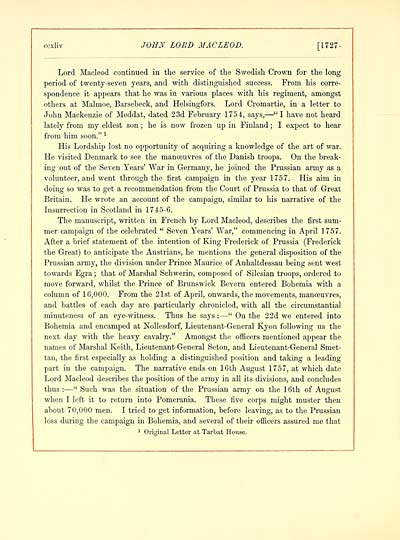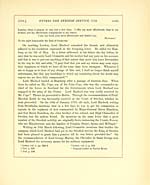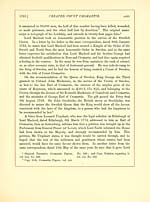Earls of Cromartie > [NSLBLANK]
(314)
Download files
Complete book:
Individual page:
Thumbnail gallery: Grid view | List view

ccxliv JOHN LORD MACLEOD. [1727-
Lord Macleod continued in the service of the Swedish Crown for the long
period of twenty-seven years, and with distinguished success. From his corre-
spondence it appears that he was in various places with his regiment, amongst
others at Malmoe, Barsebeck, and Helsingfors. Lord Cromartie, in a letter to
•John Mackenzie of Meddat, dated 23d February 1754, says, — "I have not heard
lately from my eldest son ; he is now frozen up in Finland ; I expect to hear
from him soon." l
His Lordship lost no opportunity of acquiring a knowledge of the art of war.
He visited Denmark to see the manoeuvres of the Danish troops. On the break-
ing out of the Seven Years' War in Germany, he joined the Prussian army as a
volunteer, and went through the first campaign in the year 1757. His aim in
doing so was to get a recommendation from the Court of Prussia to that of Great
Britain. He wrote an account of the campaign, similar to his narrative of the
Insurrection in Scotland in 1745-6.
The manuscript, written in French by Lord Macleod, describes the first sum-
mer campaign of the celebrated " Seven Years' War," commencing in April 1757.
After a brief statement of the intention of King Frederick of Prussia (Frederick
the Great) to anticipate the Austrians, he mentions the general disposition of the
Prussian army, the division under Prince Maurice of Anhaltdessau being sent west
towards Egra ; that of Marshal Schwerin, composed of Silesian troops, ordered to
move forward, whilst the Prince of Brunswick Bevern entered Bohemia with a
column of 16,000. From the 21st of April, onwards, the movements, manoeuvres,
and battles of each day are particularly chronicled, with all the circumstantial
minuteness of an eye-witness. Thus he says : — " On the 2 2d we entered into
Bohemia and encamped at Nollesdorf, Lieutenant-General Kyou following us the
next day with the heavy cavalry." Amongst the officers mentioned appear the
names of Marshal Keith, Lieutenant-General Seton, and Lieutenant-General Smet-
tan, the first especially as holding a distinguished position and taking a leading
part in the campaign. The narrative ends on 16th August 1757, at which date
Lord Macleod describes the position of the army in all its divisions, and concludes
thus : — " Such was the situation of the Prussian army on the 16th of August
when I left it to return into Pomerania. These five corps might muster then
about 70,000 men. I tried to get information, before leaving, as to the Prussian
loss during the campaign in Bohemia, and several of their officers assured me that
1 Original Letter at Tarbat House.
Lord Macleod continued in the service of the Swedish Crown for the long
period of twenty-seven years, and with distinguished success. From his corre-
spondence it appears that he was in various places with his regiment, amongst
others at Malmoe, Barsebeck, and Helsingfors. Lord Cromartie, in a letter to
•John Mackenzie of Meddat, dated 23d February 1754, says, — "I have not heard
lately from my eldest son ; he is now frozen up in Finland ; I expect to hear
from him soon." l
His Lordship lost no opportunity of acquiring a knowledge of the art of war.
He visited Denmark to see the manoeuvres of the Danish troops. On the break-
ing out of the Seven Years' War in Germany, he joined the Prussian army as a
volunteer, and went through the first campaign in the year 1757. His aim in
doing so was to get a recommendation from the Court of Prussia to that of Great
Britain. He wrote an account of the campaign, similar to his narrative of the
Insurrection in Scotland in 1745-6.
The manuscript, written in French by Lord Macleod, describes the first sum-
mer campaign of the celebrated " Seven Years' War," commencing in April 1757.
After a brief statement of the intention of King Frederick of Prussia (Frederick
the Great) to anticipate the Austrians, he mentions the general disposition of the
Prussian army, the division under Prince Maurice of Anhaltdessau being sent west
towards Egra ; that of Marshal Schwerin, composed of Silesian troops, ordered to
move forward, whilst the Prince of Brunswick Bevern entered Bohemia with a
column of 16,000. From the 21st of April, onwards, the movements, manoeuvres,
and battles of each day are particularly chronicled, with all the circumstantial
minuteness of an eye-witness. Thus he says : — " On the 2 2d we entered into
Bohemia and encamped at Nollesdorf, Lieutenant-General Kyou following us the
next day with the heavy cavalry." Amongst the officers mentioned appear the
names of Marshal Keith, Lieutenant-General Seton, and Lieutenant-General Smet-
tan, the first especially as holding a distinguished position and taking a leading
part in the campaign. The narrative ends on 16th August 1757, at which date
Lord Macleod describes the position of the army in all its divisions, and concludes
thus : — " Such was the situation of the Prussian army on the 16th of August
when I left it to return into Pomerania. These five corps might muster then
about 70,000 men. I tried to get information, before leaving, as to the Prussian
loss during the campaign in Bohemia, and several of their officers assured me that
1 Original Letter at Tarbat House.
Set display mode to:
![]() Universal Viewer |
Universal Viewer | ![]() Mirador |
Large image | Transcription
Mirador |
Large image | Transcription
Images and transcriptions on this page, including medium image downloads, may be used under the Creative Commons Attribution 4.0 International Licence unless otherwise stated. ![]()
| Histories of Scottish families > Earls of Cromartie > [NSLBLANK] > (314) |
|---|
| Permanent URL | https://digital.nls.uk/96761060 |
|---|
| Attribution and copyright: |
|
|---|---|
| Description | A selection of almost 400 printed items relating to the history of Scottish families, mostly dating from the 19th and early 20th centuries. Includes memoirs, genealogies and clan histories, with a few produced by emigrant families. The earliest family history goes back to AD 916. |
|---|

